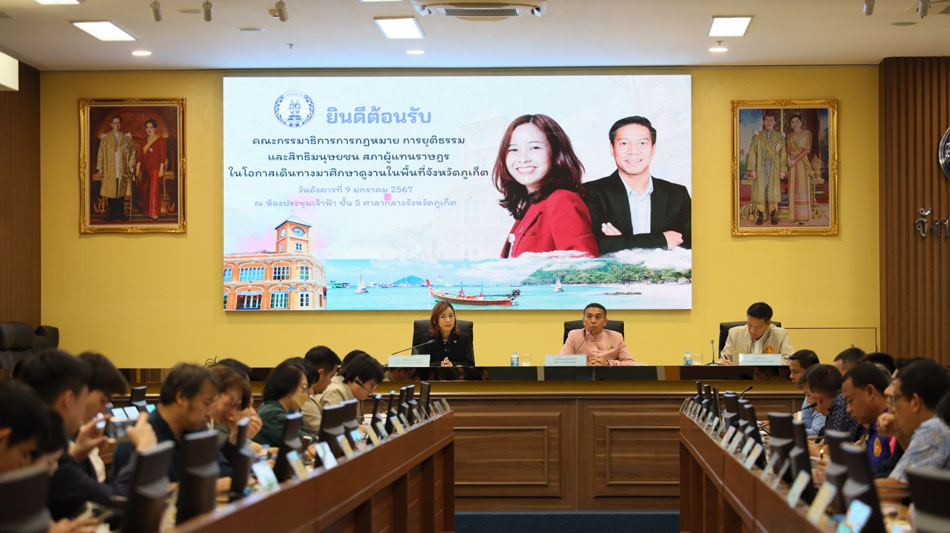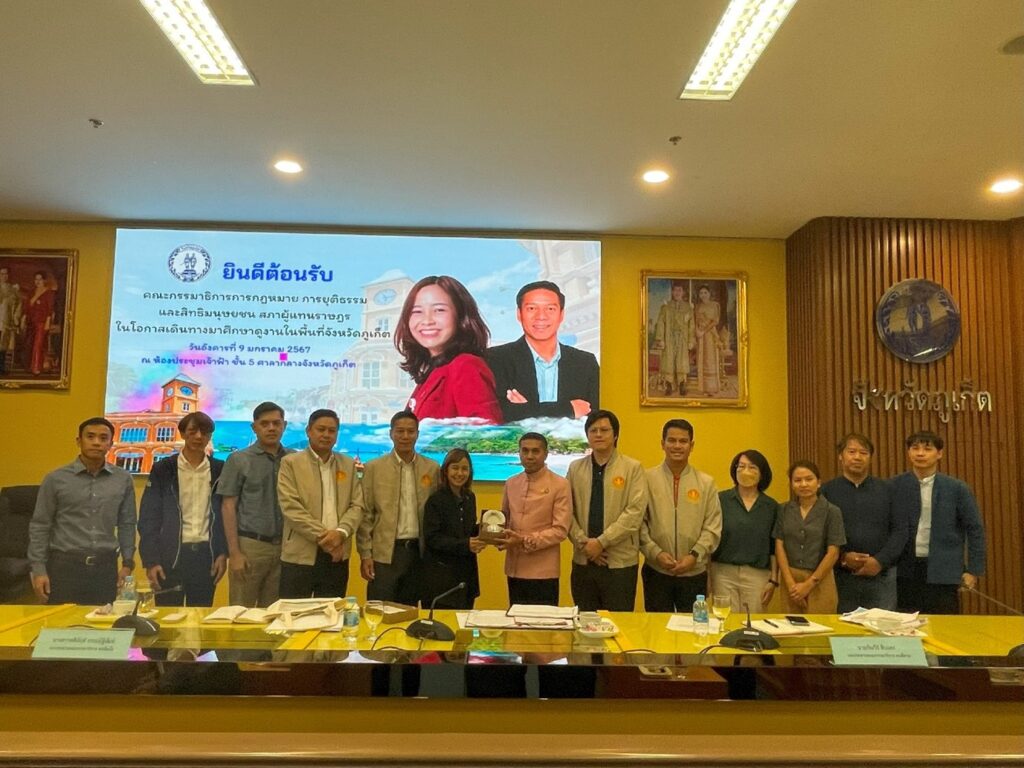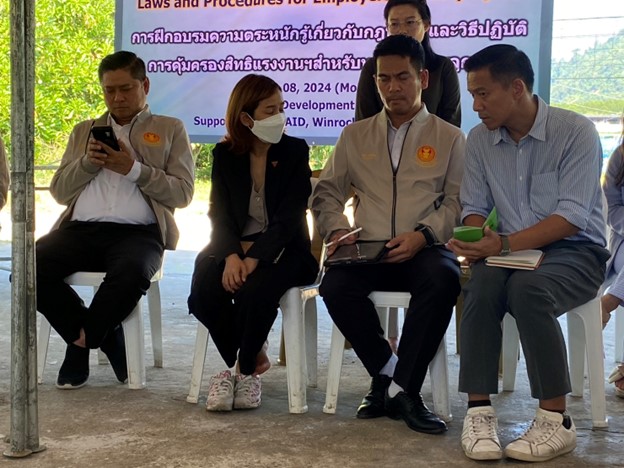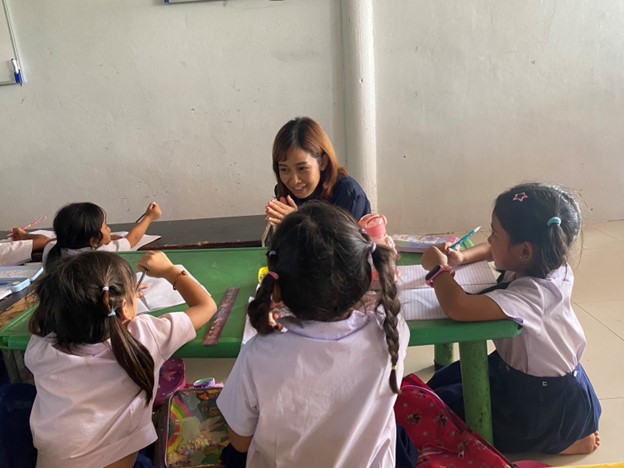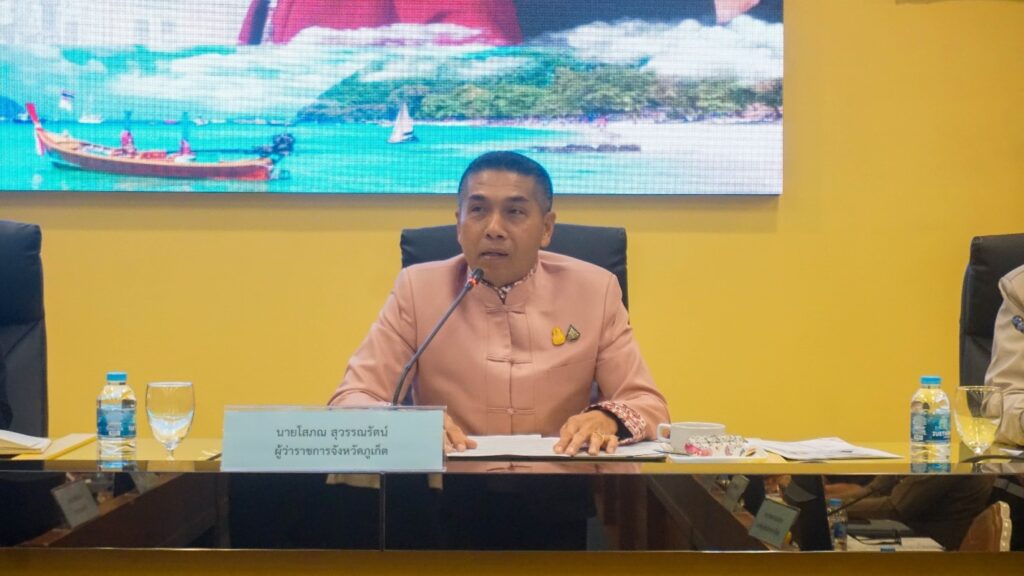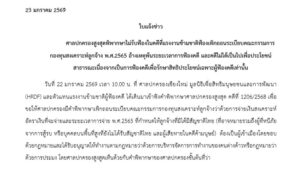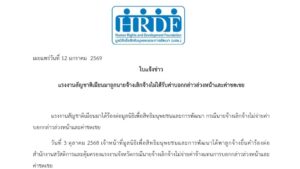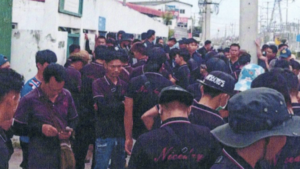During 8-9 January 2024, the Committee on Legal Affairs, Justice, and Human Rights, House of Representatives, has conducted a site-visit to explore sustainable solutions to address irregular migration of migrant workers in Phuket in Phuket, together with public agencies, civil society network and irregular migrants. It was led by Kanawee Suebsaeng, as Vice Chair of the House Committee and party-list MP and Secretary General of Fair Party, Sasinan Thamnithinan, Vice Chair of the House Committee, MP of the 11th Constituency in Bangkok from the Move Forward Party (MFP), Hiattikhun Tonyang, advisor to the House Committee, MP of the 7th constituency, Nonthaburi, from MFP, Khunakorn Manruethai, House Committee member and MP of the 6th constituency, Nonthaburi from MFP, and Worawuth Rakthiang, House Committee member and MP of the 17th constituency, Bangkok, from MFP. The other 22 participants included members of the Subcommittee to explore sustainable solutions to address irregular migration of migrant workers, advisors to the House Committee and Secretary of the House Committee, advisors to the Subcommittee, the migrant worker taskforce, the refugee taskforce and the Secretary of the House Committee.
MP Kanawee Suebsaeng, Vice Chair of the House Committee said that as the Subcommittee is established under the Committee on Legal Affairs, Justice, and Human Rights, it is pertinent for it to address human rights issues. Thailand has for a long time had to address the problems or refugees, migrant workers, stateless persons, and nationality-less persons, many of which have been put under the carpet. We need to bring them up on the surface and initiate a discussion to explore sustainable solutions to various groups of people who have been deprived of their access to basic welfares and rights as a human being. As a result, the Subcommittee has been established to explore the issues of irregular migration.
What is irregular migration? According to Kanawee, we have encountered many people who travel across the countries. These people are normally required to have a passport and a visa stamp, or other travel documents necessary to make an entry into a country. This is called a regular migration. But there have been instances that people have to travel across the border without any document of certification. Otherwise, they might have had such documents, but they have since disappeared or are regarded as unlawful according to the law in such state. In other countries, these people are called irregular migrants. In Thailand, groups of refugees along the Thailand-Myanmar border have been hosted in the nine temporary shelters, more than 99,000 of them. They have been living therefore over 40 years and Thailand cannot figure it out how to solve the problem. There are also the people from Myanmar who have come to Thailand in the wake of the military coup in Myanmar on 1 February 2021 due to the restive situation in our neighboring country. Thailand has come up with no measure to deal with them. We tend to adopt the “push back” policy which is not internationally recognized given its breach of the “non-refoulement” principle. In addition, there have been the Uyghurs who have fled from the Xinjiang Uyghur Autonomous Region in Northeast of China which has been accused of committing a crime against humanity. These people have come here since 2014 to live in Thailand and they have been detained in the Immigration Detention Centers of the Immigration Bureau. And there are not solutions for them. Will they be perpetually detained? Meanwhile, the Rohingya have been detained in the Department of Corrections’ prison/ correctional facility and we have no idea for how long they will be held up there. The migrant workers are therefore our main mission and the reason why we have come to Phuket this time to meet with people’s sector, civil society and public agencies working on the issues. We are here to compile facts and to discuss with migrant workers held up in Phuket as well as to explore the model response by Phuket. As presented by the Governor of Phuket, there are a large number of migrant workers who come to work here, mostly from Myanmar, Laos and Cambodia. The management of migrant workers is therefore very key since a systematic management of migrant workers does not just have an implication on human rights, but also economic development in Phuket which is a major economic hub in Thailand.
Kanawee further said that at present, Thailand has been striving to earn recognition in international forums. We want to become a member of the UN Human Rights Council, although we are yet to have any implementation that may address the questions raised to us during the international forums as far as the protection of basic human rights and human dignity are concerned. This could be a starting point. We have fulfilled our pledges pursuant to our international obligations on four areas including (1) birth registration to be open to register the birth of all persons including migrants in Thailand who are born here. Such birth notification is not equal to the recognition of one’s nationality/ The first birth certificate for a refugee was issued in the province of Mae Hong Son, in a temporary shelter for war refugees along the Thailand-Myanmar border. According to the migrant workers in Phuket, the reason they are prevented from registering birth is a lack of documents of certification. (2) Access to universal healthcare: This serves as a basic right of human being. Migrants and any persons living in Thailand deserve to have such access. The problems have stemmed from the use of discretion which varies among agencies affiliated to the Ministry of Public Health and local hospitals and a lack of comprehensive oversight. As a result, migrant workers and children who are their dependents in certain areas are still deprived of their access to such healthcare. A good practice can be found in Bangkok as discretion has often been made by the Bangkok Governor to allow urban refugees living on bail to purchase health insurance. 3. Alternatives to Immigration Detention: for the child refugees and their families, they should be entitled to other alternatives to immigration detention. And (4) combating discrimination and promoting good attitude toward refugees: As there are migrant workers in Phuket and other provinces in Thailand, it is important to recognize that if Thailand has no migrant workers, we shall never be able to conduct many key economic activities. We have to accept that workers from our nonboring countries have become a basic labour force for Thailand. If we adhere to the right attitude and ensure their access to various benefits, the workers in turn can help to develop Thailand legally. They can help to develop our nation through paying taxes.
Sasinan Thamnithinan, Vice Char of the House Committee, said that this visit is meant to explore issues concerning irregular migration in Phuket and to have a chance to discuss with the affected persons directly including the migrant workers and staff in public agencies and civil society organizations. We have found irregular migration is an intersectional issue and has a domino-effect since a lack of immigration status can deprive one of access to healthcare and education and subject the person to human rights violation. What is most urgent is the efficient updating of data concerning migrants and migrant workers as well as their families which involves the Ministry of Labour and Ministry of Public Health in each area. This can ensure the accuracy and consistency of the figures of registered migrant workers. Integrated effort among concerned agencies is also key. After this, the House Committee will prepare a summary report and bring it to the attention of the other members of the Committee and to submit it to the House of Representatives to explore the problems and seek legal solutions. For example, some regulations can be issued to facilitate the performance of personnel and to minimize any obstacle during their operation.
On human rights issues, Sasinan deems that irregular migration is an issue similar to other issues declared a national agenda by the government including the low birthrate and labour shortage in the future. In order to solve the problems, the government may have to look at the migrant workers as the persons who can potentially address labour shortage in Thailand. Therefore, the government should ensure a more convenient way to import foreign workers and pay attention to their children as dependents of the migrant workers. If the Thai government provide the children with access to healthcare and education, they can grow up to become quality labour force for Thailand. Therefore, the issues of migrant workers have to be tackled from various dimensions. And if we can deal with them properly, it will benefit the country on other aspects as well. The enhancement of quality of life among the workers and the promotion of education are therefore related to the development of Thailand.
Sophon Suwannarat, Governor of Phuket, who presided over the meeting said that he has instructed the Phuket Labour Authority, Phuket Public Health Authority and Phuket Education Authority to present an overview of the situation of migrant workers as requested for by the House Committee, The Governor has proposed recommendations to the Phuket Labour Authority regarding the integration of data concerning migrant workers by referencing to the method to upkeep database of foreigners by the Immigration Bureau which ensure accuracy in terms of the number of the persons travel in and out of the country and can help to easily locate the persons and make it easy for data search. Therefore, the Phuket Labour Authority, Phuket Public Health Authority and Phuket Education Authority should have in their hand the numbers of migrant workers and their dependents and such databases should be linked up at the local level. It can be presented in a dashboard to pool data from different sources. At present, it is estimated that Phuket is home for not more than 100,000 migrant workers, most of whom came from Myanmar, Laos and Vietnam. It is small compared to the number of foreign tourists which amounts to 2-3 million a year. Responsible agencies must pool together their databases and in order to tackle the problems, it must start from building an accurate and comprehensive integrated database of migrant workers in Phuket. It should indicate the detail and statuses of the migrants in the province to ensure further responses regarding access to healthcare and education among the vulnerable populations.
In adoration, the Vice Governor of Phuket has thanked the House Committee on Legal Affairs, Justice, and Human Rights to pay a visit here and to be interested in Phuket which is a tourist city generating one of the highest incomes in Thailand. Still, Phuket is plagued by problems resulting from the high costs to address economic, environmental and national security problems while it has been earmarked with rather limited budget. It is hoped that the House Committee will bring to the attention of national authorities the issues in Phuket. In addition to migrant workers, Phuket also encounters the problems of ethnic groups including the Urak Lawoi, the Morklan and the Morgan whose habitations cover the area in the provinces of Ranong, Phang-nga, and Phuket, more than 40 communities of them. They are vulnerable groups in terms of access to healthcare and education as well. And the issue that should be discussed at the provincial level concerns the children’s homes or children’s shelters. I believe there are not enough of them in Phuket to cater to the need of the irregular migrants, the undocumented migrants and those fleeing from war-torn countries. Many of them have been deported, placed under arrest by national security agencies and the Immigration Bureau. As a result, these children have been sheltered at these facilities which are not enough. A lack of shelter for groups pending deportation can be an important issue. After this, more discussions will be held among agencies directly concerned with the child dependents.
Establishing one stop service to register migrant workers, the stepping stone to solve violation of human rights and rights of migrant workers
8 January 2024, 10.30-13.00, at the Courtyard by Marriott Phuket Town Hotel, local civil society networks including the Human Rights and Development Foundation (HRDF), the Andaman Friendship Association, the Diocesan Social Action Center of Suratthani Catholic Foundation, the Phuket Provincial Authority, the Good Shepherd Phuket Foundation, the Foundation for Education and Development (FED), Thai-Nepali Association, Phuket, and other representatives and workers, have presented the problems of migrant workers at the meeting. From 13.00-17.00, the House Committee was taken to visit a community of workers to explore their issues at the Migrant Worker’s Coordination Center, the Fish Marketing Organization and the surrounding area to discuss and meet up with local workers.
HRDF has reflected on key issues encounters by migrant workers, particularly on three issues. 1. the immigration status and application for work permit among migrant workers, which has been found that due to frequent policy changes and high costs for document processing, the workers and their employers are required to frequently apply for documents. In addition, given the complex process, both the workers and their employers are unable to apply for the documents themselves in a timely manner. As a result, they have to rely on brokers, legal and illegal, causing them to pay a lot of money and increasing debt burden between the employers and the employees. It has led to other problems including the retention of the workers’ personal documents, unfair debt burden, and document processing burden and debt bondage which is indicative of the use of forced labour and human trafficking. (2) social protection, as migrant workers and their dependents including their children and family members have to face obstacles to gain access to their basic rights and social protection including birth registration, purchase of health insurance for their children, healthcare benefit, access to education for their children, social security benefits, and access to Workmen’s Compensation Fund. The obstacles to such rights can be attributed to the their immigration status which has deprived them of their access to their basic rights and protection deserved by the migrant workers and their families. And (3) labour rights, as they have been paid lower than the minimum wage. They also encounter gender discrimination including the unequal pay between male and female worker. In terms of occupational health and safety, most migrant workers are subject to high risk work including service work, construction, fishing, or work with long hours or without day-off, seizure of their asset, refusal to pay wage, unpaid wage, and document retention to prevent change of employer. In various instances, this subjects the migrant workers to forced labour. HRDF recommends that public agencies should develop a one stop service registration regime to facilitate the application for work permit and other documents, to streamline the process and minimize burden of the workers and their employers who having to go through various agencies have resorted to help from brokers. In addition, the databases should be linked up among concerned agencies involved with addressing personal status and enhancing access to basic rights among the migrant workers and their families. 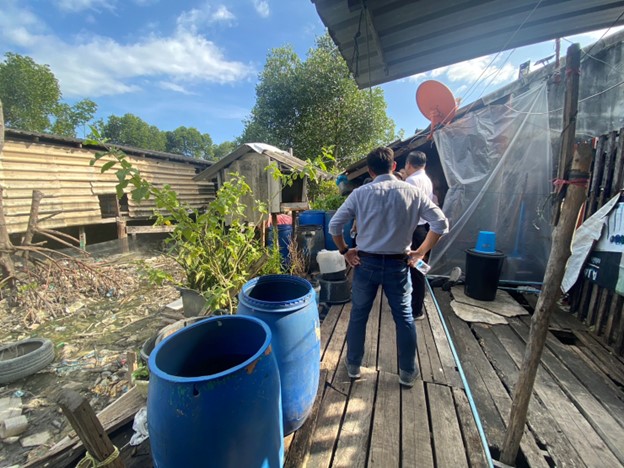
Right to education and health: Serious problem for migrant workers and their families, recognized by state, but no policy to address needs of irregular migrants
The Good Shepherd Phuket Foundation and the Foundation for Education and Development (FED) presented problems, particularly a lack of access to education among children who are dependents of the migrant workers and a difficult access to medical services for migrant workers through the social security system and health insurance of private hospital. As to education, staff of FED’s Learning Center recounted the abnormal situation in the past three years. Since 1 February 2021 when the Myanmar Army staged a military coup, it has sent the number of migrant children in FED’s Learning Centers from 300-400 to 800-1,000. The unrest in Myanmar has affected people’s livelihood. Even though many were unprepared to move, they were forced to migrate and bring their families to safety and so that they could become migrant workers. Meanwhile, given a lack of personal documents from their country of origin, the migrant children have to live here undocumented and are vulnerable to rights violation and human trafficking. The civil society network thus deems that as to education, most migrant workers are ready to support, while the civil society network and public sector are also supportive, the government should therefore give these migrant children a chance to live here legally and enroll into the Learning Centers as there have been cases of raped children who as a result of their lack of personal documents have been denied access to medical treatment and to exercise their judicial rights.
The issue of Learning Center and access to medical services among irregular migrants is therefore important. The Director of the Good Shepherd Phuket Foundation has set up Learning Centers for these children, but has to encounter questions from Thai people including “There are many vulnerable Thai children, why don’t you just help them first?” For the civil society network working to help irregular migrants, they deem that the work for education and children should not be founded on racial division. Vulnerable children, regardless of their nationality, should all have access to education. As Phuket is in need of migrant workers to serve its economic sector and is home to pilot education projects, the Learning Centers set up collectively by public agencies, civil society network and private sector should ensure children from all nations to have proper access to education. This will give them a chance to become quality workers in the future. Therefore, from the perspective of national security, it would be better to ensure the children who have fled from troubles and sought refuge here to live here safely and to have access to education and healthcare in accordance with their human rights.
Recommendations from Phuket’s migrant workers: Establishing a group under Thai Labour Federation with a medication center in the judicial process
The the Andaman Friendship Association, the Diocesan Social Action Center of Suratthani Catholic Foundation, the Thai-Nepali Association, Phuket and representatives of migrant workers in Phuket reflected that for the migrant workers in the past, it was hard to reach out for cooperation from public agencies. The current situation has got better and collaboration has been forthcoming from civil society network to offer legal assistance to the migrant workers. Due to their lack of access to judicial procedure, when the workers face a legal challenge, they are often deprived of the right to defend themselves since there is no medication mechanism between the employers and the employees, a lack of knowledge in Thai language and Thai law, and the inequal power relations. In addition, as they are subject to intimidation from both the employers and public officials, the migrant workers are thus unwilling to fight the charges as many previous cases. It is proposed that the migrant workers should be allowed to set up their group under the Thai Labour Federation so that they can use the mechanism to leverage with their employers and to gain access to the judicial procedure. The Phuket Provincial Authority should also set up a Medication Center in the judicial procedure involving migrant workers or foreign workers. As to the document application of foreigners and migrant workers, if the migrant workers who have been living in Thailand for a long time and are at least 60 years old, what would be the guidelines for them to apply for visas or Thai nationality? And for a child of migrant worker who has been born and bred and studied in a Thai school until completing university level, there should be a clear pathway for them to apply for Thai nationality and apply for documents.
As to the issue of gender inequality, labour rights violation is rampant in Phuket. The migrant worker has cited cases of female migrant workers who are often paid less than their male counterparts. They could be dismissed as a result of their getting pregnant as well. Female workers are also paid less than the legal minimum wage. In Phuket, most migrant workers are paid less than 370 baht/day, particularly the domestic workers, most of whom are female migrant workers who have to have longer than eight hours per day. Some of them have been denied their salaries, day-off, or may face a dismissal without prior notice. For example, in Phuket during the long weekend or tourist season, women employed as domestic workers in hotels have to work during holidays and are denied holiday pay. In addition, the employers may not care to ensure safety in their accommodation. Some workers who have been subject to physical assault or got sick from their work, have to pay for their own medical treatment as their employers refuse to pay for them. In addition, some legal migrant workers can turn into illegal workers as the employers have failed to apply for them proper documentation while shifting all the burden to the employees.

